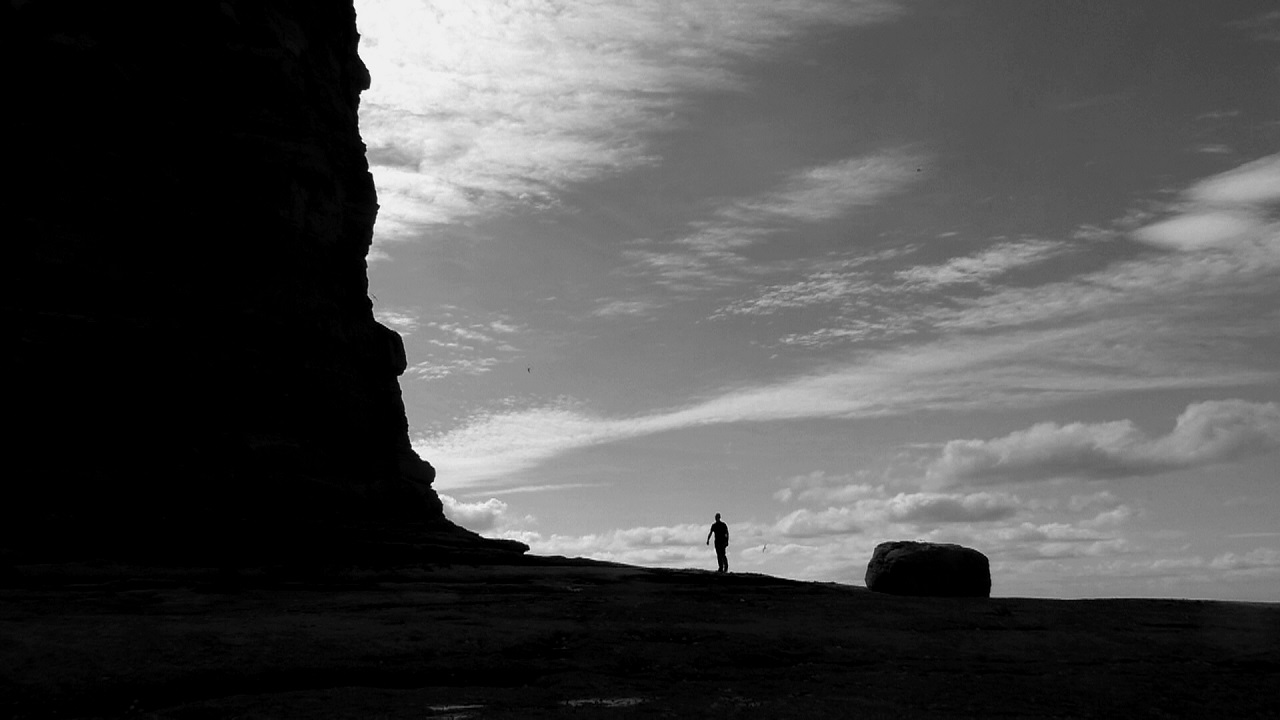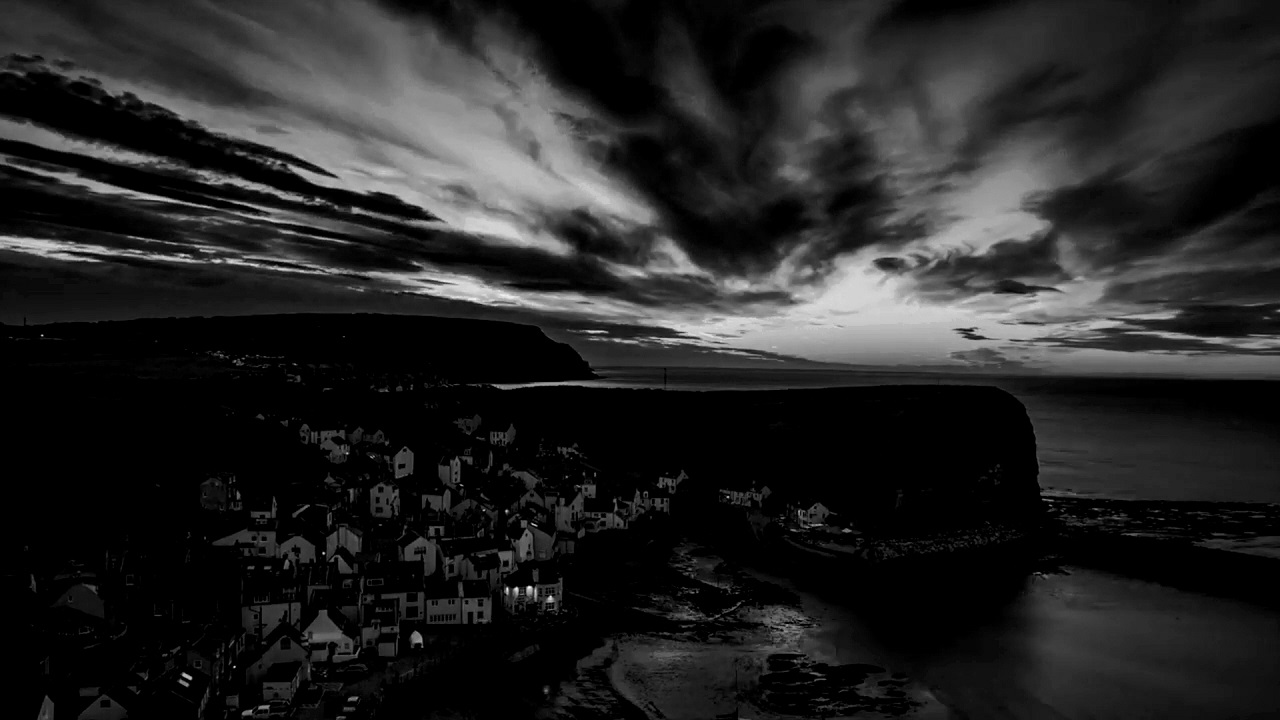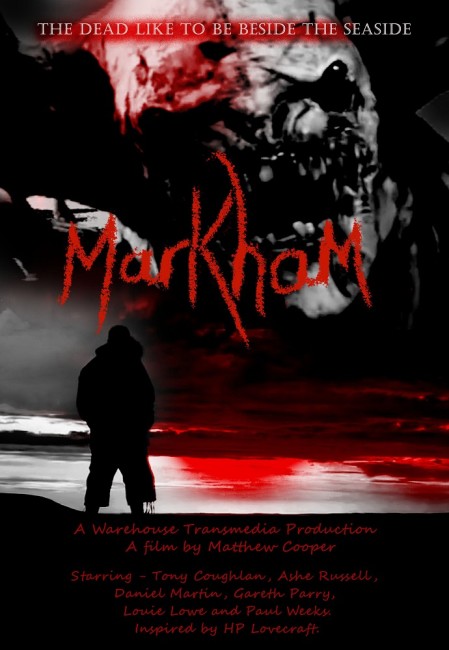UK. 2020
Cast
Director/Photography (b&w) – Matthew Cooper, Screenplay – Matthew Cooper & Alison Pennells, Inspired by the Writing of H.P. Lovecraft, Producer – Alison Pennells, Music – Mariella Nelson Renaud. Production Company – Warehouse Transmedia.
Cast
Thomas Cody (Jack), Tony Coughlan (Zak), Ashe Russell (Rob), Gareth Parry (Matt), Daniel Martin (Dekker)
Plot
Jack is hired by the film director Rob who wants him to go to the town of Markham and shoot some reality-based horror footage for a Russian backer. Jack heads to Markham, near Whitby in the north of England, and finds it to be a strange town. Unknown to Jack, Rob is secretly filming using actors he has set up to interact with him.
Markham was a feature-length debut for British director Matthew Cooper. Cooper had previously made several short films and worked as a scriptwriter on popular UK tv shows like Emmerdale Farm (1972- ), Eastenders (1985- ) and Hollyoaks (1995- ).
With Markham, Matthew Cooper makes an H.P. Lovecraft film. Lovecraft was an author writing in the 1920s and 30s whose work broods with a sense of cosmic horror, of scientists uncovering forbidden knowledge, elder gods slumbering and awaiting to be released and the like. (For greater detail see Lovecraftian Films). Although other reviewers have made the assumption that Markham is based on an existing Lovecraft story, this is not the case and it only draws on Lovecraft in a generalised sense. Matthew Cooper has announced plans to make several other Lovecraft films, the first of which were When the Earth Gives Up the Dead (2022) and H.P. Lovecraft’s The Shadow Over Innsmouth (2023).
Matthew Cooper shot the film in Whitby, Yorkshire, whose greatest claim to fame is that it is the location where Bram Stoker’s Dracula (1897) takes place. Markham comes with some of the most stunning black-and-white photography I have seen in any film in some time. Cooper (who conducts the photography himself) creates beautiful shots of the roads, skies, churches, of figures crossing bare and empty fields, and the town itself (which becomes something quite sinister under the b/w lighting). There is one breathtaking shot of the clouds above the town lit up by flashes of seemingly eldritch lightning that you leaves you not sure whether it is an actual shot or one created by effects.
On the other hand, Markham is all mood and … well nothing else. Exactly what is going on is utterly confusing. Thomas Cody is given the assignment by director Ashe Russell to go to Markham (in fact Whitby) and get some Candid Camera-style horror reactions for a never-seen Russian backer. It then confusingly appears that rather than actually shooting any footage that Russell has hired an actor (Tony Coughlan) to give dire warnings to Cody and is secretly filming him. The film takes on a weirdly meta-fictional level – sections of the script even come overlaid on the screen describing what is happening at one point.


There are assorted scenes where Thomas Cody wanders around the town and in voiceover quite effectively contrasts Whitby past and present (represented by stock footage of the town in its heyday) with usual Lovecraftian portentous dialogue. There are some scenes where Russell has spiked Thomas Cody’s teabags with hallucinogens and he experiences a trip, including a rowdy mob of people (that we never see) outside his hotel room. The latter sections of the film fragment off with Cody running amok, killing various locals and the film crew, then stabbing Ashe Russell and assuming directorial control of the film. The opening credits come overlaid with a bunch of contemporary buzzwords like Covid-19, Fake News, Epstein, Russian Interference, and tell us “We are watching you watch this film,” which makes it sound like a mad YouTube conspiracy video even though these have no relevance to the film that follows.
This is one of the most frustrating and incoherent films I have seen in some time. It seems to be a film that operates without any kind of plot, just the never-too-clear one about Thomas Cody being set up by a filmmaker. This also seems far removed from H.P. Lovecraft. What the film lacks is any of the essence of Lovecraft – the plot set-up leaves you with the expectation of something akin to The Shadow Over Innsmouth (1931) where the narrator discovers the locals are involved in miscegenation with fish people. The only Lovecraftian element we get is a visit to a dolmen that is referred to as ancient artefact; a really crappy optical of a fish person that attacks two crew members in the opening scene; and an even worse effect of a two-headed snake that is supposed to represent the appearance of Cthulhu at the end.
Other films based on the works of H.P. Lovecraft include:- The Haunted Palace (1963), Die, Monster, Die/Monster of Terror (1965), The Shuttered Room (1967) and The Dunwich Horror (1969). The big success in the modern era was Stuart Gordon’s splattery black comedy version of Re-Animator (1985), which popularised Lovecraft on film. This led to a host of B-budget Lovecraft adaptations, including Stuart Gordon’s subsequent From Beyond (1986), The Curse (1987), The Unnameable (1988), The Resurrected (1992), Necronomicon (1993), The Unnamable II: The Statement of Randolph Carter (1993), Lurking Fear (1994), Stuart Gordon’s Dagon (2001), The Dream-Quest of Unknown Kadath (2003), Beyond the Wall of Sleep (2006), Cool Air (2006), Chill (2007), Cthulhu (2007), The Tomb (2007), Colour from the Dark (2008), The Dunwich Horror (2009), The Color (2010), Pickman’s Muse (2010), The Whisperer in Darkness (2011), The Dark Sleep (2013), The Haunter of the Dark (2015), Herbert West: Re-Animator (2017), Color Out of Space (2019), H.P. Lovecraft’s The Deep Ones (2020), the tv series Lovecraft Country (2020), H.P. Lovecraft’s Witch House (2021), The Resonator: Miskatonic U (2021), The Lurking Fear (2023) and Suitable Flesh (2023). Lovecraft: Fear of the Unknown (2008) is a documentary about Lovecraft. Also of interest is The Manitou (1978), which features an appearance of the Great Old One; Cast a Deadly Spell (1991) and its sequel Witch Hunt (1994), a tv movie set in an alternate world where magic works and where the central character is a detective named H.P. Lovecraft; Juan Piquer Simon’s cheap and loosely inspired Cthulhu Mansion (1992); John Carpenter’s Lovecraft homage In the Mouth of Madness (1995); the fan parody The Last Lovecraft: Relic of Cthulhu (2009) and the parody Call Girl of Cthulhu (2014); even a trilogy of animated children’s film Howard Lovecraft and the Frozen Kingdom (2016), Howard Lovecraft and the Undersea Kingdom (2017) and Howard Lovecraft and the Kingdom of Madness (2018) in which a young Lovecraft encounters his own creations; while Batman faces Lovecraftian horrors in the animated Batman: The Doom That Came to Gotham (2023). The Elder Gods turn up at the end of The Cabin in the Woods (2012), Lovecraft (Paul Titley) appears as an imaginary companion in Ghostland/Incident in a Ghostland (2018) and In Search of Lovecraft (2008) features a tv news crew discovering that Lovecraft’s works are true. Lovecraft’s key work of demonic lore The Necronomicon also makes appearances in films such as Equinox (1970), The Evil Dead II (1987) and Army of Darkness (1992), and was also borrowed as an alternate retitling for Jesus Franco’s surreal and otherwise unrelated Succubus/Necronomicon (1969) about a BDSM dancer.
(Winner for Best Cinematography at this site’s Best of 2020 Awards).
Trailer here

